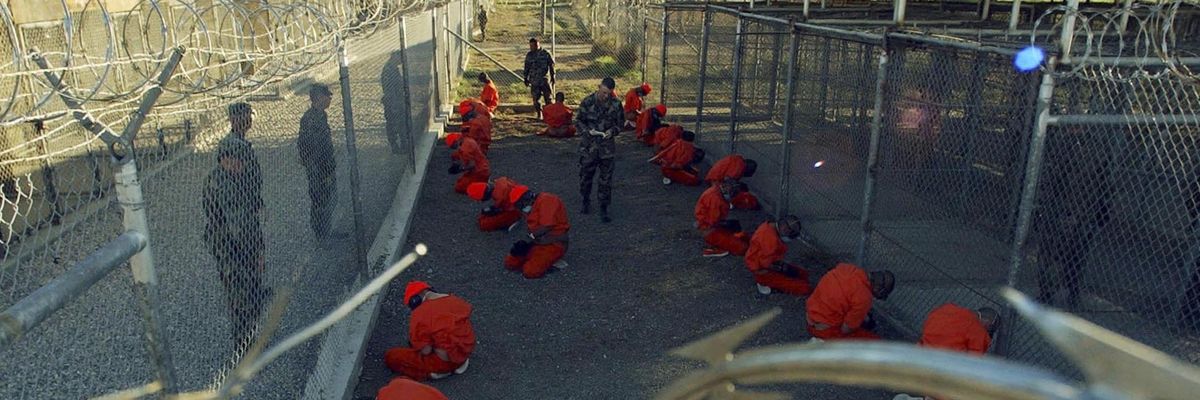More than twenty years after the prison at Guantanamo Bay opened, the 30 remaining detainees are still subjected to “cruel, inhuman and degrading treatment,” according to a new report from the United Nations special rapporteur (SR) on counterterrorism and human rights, Fionnuala Ni Aolain’s report.
The document, which was released to the public on Monday, was the result of a trip to the facility earlier this year — the first of its kind by a UN official since the facility opened in 2002. Its conclusion is clear: the U.S. government should “consider immediate paths to closure” of the detention center.
Ni Aolain’s visit, which took place in February, included a series of meetings with prisoners’ lawyers and families, as well as former prisoners and some of the then-34 detainees.
Ni Aolain also spoke with families of the victims of the 9/11 attacks. She “recognizes differing views within the victim community on the legitimacy of the military commissions, the use of the death penalty, and the operation of the Guantánamo detention facility.” But, in her view, the use of torture by the United States now represents the “single most significant barrier to fulfilling victims’ rights to justice and accountability.”
“[A]ccountability for torture is also accountability to the human rights of victims and survivors,” she writes.
In her report, Ni Aolain thanked the Biden administration for facilitating her visit but criticized the U.S. government for ongoing violations of international law. “[S]everal U.S. Government procedures establish a structural deprivation and non-fulfilment of rights necessary for a humane and dignified existence and constitute at a minimum, cruel, inhuman, and degrading treatment across all detention practices at Guantánamo Bay,” she wrote.
The report focused on detainees’ right to health, access to family, access to justice and fair trial, and the long-term physical and psychological effects of torture. In each case, the special rapporteur found significant reason for concern.
For example, the special rapporteur “concludes that the foregoing conditions constitute a violation of the right to available, adequate, and acceptable health care—as part of the State’s obligation to guarantee the rights to life, freedom from torture and ill-treatment humane treatment of prisoners, and effective remedy (...) the U.S. Government’s failure to provide torture rehabilitation squarely contravenes its obligations under the Convention against Torture.”
In terms of legal rights, the report found that “the United States has failed to promote and protect fundamental fair trial guarantees and severely impeded the detainees’ access to justice.” One detainee told Ni Aolain that, while some of the material conditions in the prison had improved over time, the legal conditions today are worse than ever.
The report also looked at the repatriation and resettlement of those who had been released from Guantanamo and found that they had experienced mixed fortunes but that the “vast majority” continued to be victims of human rights abuses. “For many former detainees, their current experience in their home or third country merely becomes an extension of arbitrary detention in Guantánamo, with some even expressing that they wish to return,” wrote Ni Aolain. “The SR spoke with former detainees and families of detainees who upon transfer were forcibly disappeared and arbitrarily detained; enrolled in supposed rehabilitation and reintegration programs but in fact subject to incommunicado detention and torture and ill-treatment,” and more.
Michèle Taylor, the U.S. ambassador to the United Nations Human Rights Council, issued a response to the report, thanking Ni Aolain but disagreeing with many of her report’s findings. “The United States disagrees in significant respects with many factual and legal assertions the SR has made,” Taylor wrote. “Detainees live communally and prepare meals together; receive specialized medical and psychiatric care; are given full access to legal counsel; and communicate regularly with family members.”
Under Biden, so far 10 of the 40 detainees that were there when he took office have left the prison, and 16 others have been cleared for release but remain in Guantanamo.
Advocates, rights groups, and former detainees welcomed the report and called on Biden to fulfill his stated goal of closing the prison, and for the government to provide reparations to prisoners.
“I was a victim of US torture by the CIA. I survived and have forgiven my torturers, and I am moving on with my life in Belize. But I still wait for an apology, medical care, and other compensation,” said Majid Khan, a former detainee who was released in February 2023. “I appreciate all the support that Belize has provided me, but responsibility lies with the US.”
“It is time to close Guantanamo,” Khan added.
“The Biden administration needs to get out of its own way on Guantanamo closure,” argued Wells Dixon, a senior staff attorney at the Center for Constitutional Rights who has served as counsel to several Guantanamo detainees. “It makes no legal or policy sense for the government to continue to fight in court, to detain men it no longer wants to detain, in a prison it has said should be closed, in a war that has ended.”














